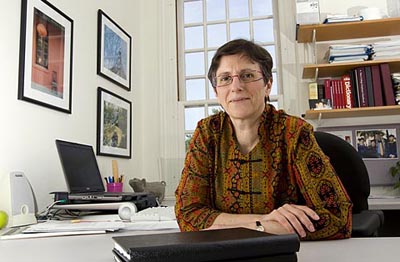Inside China

Margaret Maurer-Fazio, the Betty Doran Stangle Professor in Applied Economics, has led or co-led seven Fall Semester Abroad and Short Term programs to China. Photograph by Phyllis Graber Jensen.
Bates economist Margaret Maurer-Fazio has tracked China’s economy since the early 1980s. Like an angler pulling trout from a roiling stream, Maurer-Fazio has drawn valuable research from the tumult of China’s economic liberalization. She specializes in certain aspects of the changing labor market — rural-to-urban migration, gender and wage issues, the treatment of Muslim and other minorities, the work course of urban Chinese women.
A member of the Bates economics faculty since 1994, Maurer-Fazio last year was appointed Betty Doran Stangle Professor in Applied Economics. She first visited China as a tourist in the early 1980s, and has had a ringside seat as three decades of economic liberalization have transformed the nation literally from the ground up.
Following are edited excerpts from a conversation last May with staff writer Doug Hubley.
Maurer-Fazio: It’s mind-boggling to see a country change so rapidly. I grew up on Vancouver Island; I could go back to Vancouver today and recognize a lot of buildings that I used to see as a small child. But Shanghai looks completely different. For a long time, Shanghai needed to put out new city maps every three months.
The first time I went to China, you couldn’t really buy anything. There wasn’t much for sale. And now it’s a consumer’s paradise. Nanjing, where we have based our Fall Semesters Abroad, now has a subway. Around one of the downtown subway stops, there are underground malls that have hundreds of very small stores. One of my favorite examples is a store called, in translation, the “Korean Cell Phone Beautification Store.” The whole store was kitsch for cell phones, but it wasn’t just kitsch — it was Korean-style kitsch! It was that specialized.
I’m pretty sure that the Chinese generation gap is larger today than it has ever been in any country. Young people are so conspicuously consuming, but their parents’ generation didn’t have those kinds of resources. And they just treasured education. Yet today you’ll see young people addicted to Internet games, to the degree that they may even drop out of school.
When the announcement went out that China had won the bid for the 2008 Olympics, there was enormous national pride. So what has happened in the last few months, the protests of the torch run and the local suppression of demonstrations, was totally unexpected by the Chinese leadership, I think.
It may end up that hosting the Olympics turns out to be very negative for the way China is viewed by the world. I think the Chinese are worried about what may have been sacrificed in order to have a smoothly run, efficient Olympics.
With faculty colleagues, Maurer-Fazio has led seven Fall Semester Abroad and Short Term programs in China. She speaks of “amazing synergies” that come out of these visits; for example, she involved FSA participants David Kampf ’05 and Deirdre Grant ’05 in a formal assessment of a pilot ecotourism project in Ganzi, a county in western Sichuan. The project is designed to boost the local economy while protecting both the area’s natural wealth and its indigenous Tibetan culture. The first Westerners to experience the project, the 2006 FSA group put it to the test.
Maurer-Fazio: We took the group to experience it and to give feedback to Wang Wei, a conservationist who is running the project. First we invited him to Nanjing to tell us about the project, and then we traveled to the area together. We went to the Wolong Nature Reserve, the famous panda reserve, and then traveled for a couple days through some of the most beautiful scenery I’ve ever seen in my life: mountains, rolling grasslands, rivers, different kinds of flora and fauna. It is just breathtakingly beautiful.
The students really had a great time. Once we got to the base camp, in Yajiang, one group of energetic and athletic folks went on a 17-kilometer hike up to more than 4,000 meters and stayed overnight in a yak shed, and hiked down the second day. They got to a high-altitude lake. For them, the hike was the adventure.
The project was designed to employ local people but not leave a huge imprint on the local area. It’s intended to bring in tourists who would not do a lot of damage — it’s a very fragile high-altitude ecosystem. So, people who were willing to rough it and didn’t need all kinds of amenities. Part of the marketing was to bring people to where they could observe the local culture, which is predominantly Tibetan, and there was certainly an effort not to have it sinicized, but to keep it in its local form.
The 2000 FSA group visited the Xinjiang Uyghur Autonomous Region, in the northwest. A student on the tour, Anna Purtell ’02, was so intrigued by the region that she wrote her thesis about occupational types and compensation there. That project launched Maurer-Fazio and fellow Bates economist Jim Hughes on a series of collaborations that’s still going strong, including a project investigating labor force participation among ethnic minorities, of which China recognizes 55 different groups.
Maurer-Fazio:We find that over time urban women have dropped out of the labor force in considerable numbers in China, pretty much across all ethnic groups. In the late 1990s, the government laid off huge numbers of workers from state-run industries. Women lost those jobs at a disproportionately high rate and then had a harder time finding new ones than men. So a lot of women got so discouraged that they left the labor force.
But it turns out that married women are dropping out of the labor force in ways quite different from single women, across all ethnic groups, and we think this reflects a resurgence of traditional expectations about gendered household roles and the return of married women to “home production” — housework, child care, and so on.
Ethnic women have dropped out at slightly higher rates than the majority Han women. Ten of China’s ethnic minority groups are Muslim, and of those, two of the larger ethnic minorities are the Hui and the Uyghurs. Hui women have dropped out of the labor force at rates almost 20 percentage points higher than Han women.
This was a really surprising result, because the Hui are very well-integrated with the Han in many parts of China. In many parts of China, they may be the only ethnic minority that a Han person would see. And they speak Chinese and they use Chinese language. We’re thinking this may be a robust cultural or religious difference that surfaced when the state relaxed its control over individuals’ lives.
For the Uyghurs in Xinjiang, we found that men tended to drop out of the labor force at 20 percentage points more than Han men had over the same period. And we have some evidence that this is very discriminatory. There has been a lot of in-migration of Han into Xinjiang, and we think it’s very much that the Uyghur men are getting closed out of particular labor markets. So we have a project for the next year, where we’re looking into that in more detail.
Jim and I have a good partnership. We tend to share the analysis and the writing. And he’s really good at the labor literature and I’m very good at the China literature, so I can contribute things that are very specific to China. And he’s very, very good at the econometric analysis. So our work is very complementary, and not particularly set roles.
In their China visits, Maurer-Fazio encourages her students to drop their preconceptions and really perceive what’s around them. She boils the concept down to seven words of antimetabole: “Learn to observe and observe to learn.”
Maurer-Fazio: The Western press tends to present China as some sort of unmitigated environmental disaster. But during the “Sustaining the Masses” Short Terms [which brought students to China to study environmental and economic policy in 1999, 2001 and 2004], students saw how engaged the Chinese were in mitigating environmental problems. We visited places where people, especially particular individuals, had come up with solutions that both benefited local residents economically and protected the environment.
When we met on campus for the 2004 Short Term, students were sure that every piece of clothing produced in China came from a sweatshop. And when we got to China, we took them to a garment factory. It was well-ventilated, well-lit, people were happy, the factory had a long list of people waiting to get jobs there. The income was not particularly high, but was a lot higher than the income of local farmers. I thought the working conditions were really good.
But students, just because it was textile work, assumed it was a sweatshop. And when we took them to this factory, they felt justified in all their preconceptions. ‘Look! A sweatshop!’ [She laughs.]
Until they saw the alternative. Just a few days later, we went to a rice-growing area. It was transplanting season. When students saw that, they suddenly thought those factory jobs looked pretty good. That was interesting to see. It was like light bulbs going on when we visited the rice paddies.
So, see what you’re seeing, think about what you’re seeing, ask questions about it. Rather than, on a field trip, falling asleep on the bus or just listening to your iPod — on the journey itself you want to observe what’s going on around you. And that’s not something that young people automatically do. I think it is a learning process.
Interview by Doug Hubley

VIEW SLIDE SHOW: Inside China-Photographs from the 2006 Bates Fall Semester Abroad trip to Ganzi Tibet Prefecture, western Sichuan Province.


